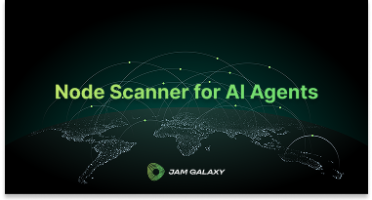
Patrik Gudev
Project OwnerLeads vision and strategy for building autonomous AI infrastructure.
DEEP Connects Bold Ideas to Real World Change and build a better future together.
Coming Soon
We propose Node Scanner for AI Agents, a unified interface to discover, benchmark, and simplify deployment across decentralized compute networks. It tackles the fragmentation of DePIN by introducing real-time node monitoring, a standardized Latency Score, and streamlined Docker deployment. We will demonstrate AI agents dynamically selecting and redeploying compute based on performance a key step toward self-managing AGI infrastructure. The project also explores integration with the SingularityNET Marketplace to enable autonomous service deployment.
The purpose of this RFP is to identify, assess, and experiment with novel computing paradigms that could enhance AGI system performance and efficiency. By focusing on alternative architectures, this research aims to overcome computational bottlenecks in recursive reasoning, probabilistic inference, attention allocation, and large-scale knowledge representation. Bids are expected to range from $40,000 - $80,000.
Comprehensive Research Plan outlining objectives, methodology, timeline, and AGI relevance Categorized List of Alternative Compute Platforms, including DePIN-based (e.g., Akash, Cudos) and traditional (e.g., AWS, Azure) infrastructures. Initial Benchmarking Criteria defining key metrics (latency, cost, scalability, energy efficiency), Literature Review Framework detailing sources and topics to be reviewed in Milestone 2.
1) Research plan with objectives, methods, timeline, and AGI relevance 2) List of DePIN and traditional compute platforms to benchmark 3) Initial benchmarking criteria (latency, cost, scalability, energy) for AGI tasks (e.g., PLN, MOSES, ECAN) 4) Literature review outline for Milestone 2 5) Project execution plan with setup, and milestone timeline
$20,000 USD
1) Clear research plan aligned with AGI objectives and RFP scope 2) 3–5 compute platforms identified and categorized (DePIN + traditional) 3) Benchmarking metrics defined and mapped to AGI-relevant tasks 4) Literature review topics scoped and approved for next phase 5) Project structure validated and ready to begin experimentation in Milestone 2
This milestone focuses on conducting a structured literature review of alternative compute architectures and finalizing the benchmarking framework. The review will cover decentralized and non-traditional paradigms (e.g. DePIN networks) with respect to AGI-relevant computational demands such as recursive reasoning attention mechanisms and probabilistic inference. We will also finalize a standardized benchmarking protocol for evaluating compute efficiency latency scalability and cost across all selected platforms.
Literature Review Report covering academic and industry research on: a) DePIN performance and architecture tradeoffs b) Non-traditional compute paradigms (e.g. analog computing in-memory processing) c) AGI workload characteristics (e.g. PLN ECAN MOSES requirements) Benchmarking Criteria Specification: a) Final list of evaluation metrics (e.g. latency throughput power use deployment complexity) b) Normalization strategies for fair cross-platform comparison c) Mapping of metrics to AGI workload types Evaluation Templates: a) Structured formats for recording measurements across all test platforms Template for comparative analysis (DePIN vs. centralized providers)
$20,000 USD
a) Delivery of a focused, AGI-specific literature review covering at least 8–10 key sources b) A finalized, peer-reviewable benchmarking framework clearly tied to AGI workloads c) Evaluation templates completed and approved for data collection in Milestone 3 d) Internal validation showing benchmarking logic can be consistently applied across platforms
This milestone delivers the first operational version of the Node Scanner — a real-time monitoring engine that collects and visualizes key performance metrics across decentralized and centralized compute nodes. The system will measure latency uptime bandwidth and resource availability. A geolocation map will visualize the global distribution of nodes to highlight regional performance variability — crucial for understanding infrastructure suitability for latency-sensitive AGI workloads.
1) Live Node Monitoring System (Backend + Data Pipeline) 2) Collection of real-time metrics from selected nodes (3+ DePIN 2+ centralized) 3) Metrics: latency response time uptime bandwidth CPU/GPU presence Performance Dataset 1) Structured logs of all test data collected under AGI-relevant benchmarking conditions Feasibility Report 1) Technical analysis of platform readiness for recursive reasoning inference workloads 2) Includes node-level observations on volatility cost and uptime Node Map Visualization 1) Interactive world map showing node locations performance health and latency clustering 2) Supports filtering by provider location and performance range Platform Comparison Dashboard (Prototype UI) 1) Displays Latency Scores availability and cost across all tested platforms 2) Sets the foundation for the public-facing version in Milestone 4
$20,000 USD
1) Real-time measurement engine deployed and collecting data from distributed nodes 2) At least 5 geographically distinct nodes actively monitored 3) First version of the geolocation map displaying live performance indicators 4) Visual and technical reporting ready to guide final prototype and AGI relevance evaluation
This milestone delivers the complete working prototype of the Node Scanner system. It includes a public-facing dashboard performance maps and comparative benchmarks for decentralized and centralized compute platforms. The milestone will also include a final evaluation report summarizing experimental results feasibility for AGI workloads and a prototype scenario where an AI service or agent uses the system to guide deployment or scaling decisions based on performance metrics.
1) Final Node Scanner Platform (Frontend + Backend) 2) Live public dashboard showing real-time metrics Latency Scores node availability 3) Interactive map of global node distribution and regional performance analysis 4) Filtering by cost latency uptime and provider Final Evaluation Report 1) Comprehensive analysis of each tested platform’s suitability for AGI workloads (e.g. PLN MOSES ECAN) 2) Energy efficiency and cost-performance comparison 3) Scalability and long-term deployment feasibility assessment Proof-of-Concept Scenario 1) AI workload or script that selects a node based on measured metrics 2) Demonstrates runtime adaptation — a foundational AGI behavior Documentation & Replication Guide 1) Clear technical documentation for infrastructure metrics and experiments 2) Guide for replicating the benchmarking process or extending the platform
$20,000 USD
Fully functional and accessible Node Scanner prototype with live data and UI Final report delivered with complete analysis, AGI relevance, and comparative insights Successful execution of a self-optimizing workload scenario Platform ready for public use, contribution
Reviews & Ratings
Please create account or login to write a review and rate.
Check back later by refreshing the page.
© 2025 Deep Funding
Join the Discussion (0)
Please create account or login to post comments.